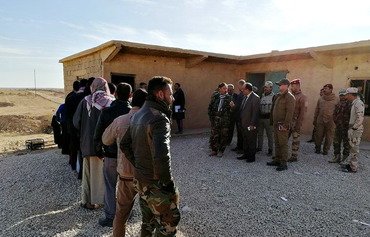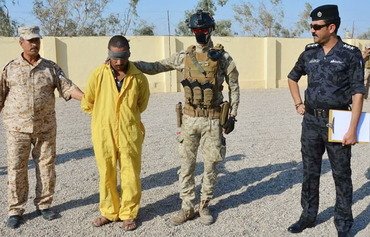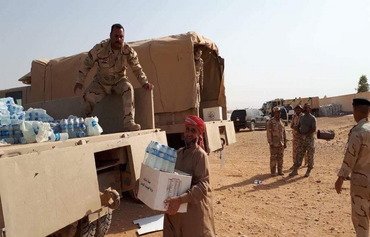The Iraqi border town of al-Qaim in western Anbar province is seeing increased security and stability and has recently welcomed back hundreds of internally displaced persons (IDPs).
Despite the town's close proximity to Syria, where on the other side of the border pockets of "Islamic State of Iraq and Syria" (ISIS) are still active, the security situation in the city is "very good", said al-Qaim mayor Ahmed al-Dulaimi.
Until its liberation on November 3rd, 2017, al-Qaim was part of ISIS's "Wilyat al-Furat" (Euphrates province), which included other towns on the Syrian side of the border.
The area constituted a base for the group and a launchpad for its attacks on Iraqi cities and provinces.
![Security forces on July 28th accompany 119 displaced families returning to their areas in al-Qaim from displacement camps in al-Habbaniyah. [Photo courtesy of the 8th Infantry Division Command]](/cnmi_di/images/2018/08/21/13788-Iraq-Anbar-Qaim-600_384.jpg)
Security forces on July 28th accompany 119 displaced families returning to their areas in al-Qaim from displacement camps in al-Habbaniyah. [Photo courtesy of the 8th Infantry Division Command]
Following the expulsion of ISIS, Iraqi forces have been deployed deep into the surrounding desert, securing the border with Syria.
The security situation on the other side of the border, in the Syrian town of Deir Ezzor, will not affect al-Qaim as the border is "fully secured by Iraqi army units, border guard and tribal forces", al-Dulaimi told Diyaruna.
"Some may still have concerns over the fact that the area adjacent to [al-Qaim] remains volatile and a part of it is under ISIS control," he said, "but the ability of Iraqi forces to impose security, the co-operation of residents and the fact that ISIS was driven back inside Syrian territory up to three kilometres from the border is reassuring".
IDPs return
The Iraqi army’s 8th Infantry Division announced in a July 28th statement the return of 119 displaced families to al-Qaim from IDP camps in al-Habbaniyah.
They were allowed to return after their personal data was checked by security agencies, the statement said.
The improvement in the security situation has contributed to the return of displaced families from IDP camps in al-Habbaniyah, Sheikh Rabah al-Mahalawi, a tribal mobilisation forces commander in al-Qaim told Diyaruna.
The IDPs’ return is not limited to those who fled the city to escape ISIS, but also includes the displaced families of ISIS elements from the Kilo-8 camp, whose ISIS sons have fled outside the country, he said.
"The number of returnees is growing by the day," he said, noting that the main thing that is preventing everyone from returning is the state of the services sector -- including water and electricity shortages -- and "not any security hurdles".
Restoring services
Anbar provincial council economic committee member Fahd Mishaan called on the federal government and the international community to move quickly to rebuild the infrastructure and services in al-Qaim in order to consolidate stability in the city.
"Al-Qaim, like many cities in Anbar province, was devastated by ISIS and subsequent liberation battles, necessitating a rebuilding effort funded by the federal government or through pledges by donor countries," he told Diyaruna.
The launch of rebuilding projects would absorb the unemployment in the city, he said.
"In al-Qaim alone, there are two of the largest Iraqi Ministry of Industry-run factories -- the al-Qaim phosphate plant and al-Qaim cement plant, which are capable of absorbing between 40% and 50% of the unemployed in the city," said Mishaan.
These plants and other economic installations are non-operational, either because the power lines that feed them have been cut off or because they were looted by ISIS, he said, adding that they can be "easily and quickly repaired".

![Displaced residents get their identification documents checked upon their return to al-Qaim, as the western Anbar town sees improved security. [Photo courtesy of the 8th Infantry Division Command]](/cnmi_di/images/2018/08/21/13789-Iraq-Qaim-displaced-600_384.jpg)






